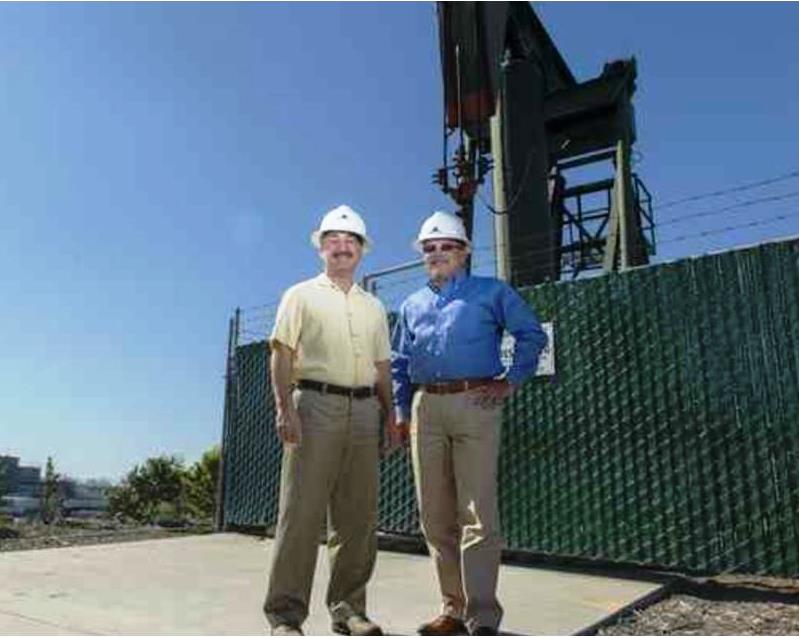
SHP & CSULB Private Partnership
November 24, 2015The Long Beach Business Journal wrote an article about the benefits CSULB gains from private partnerships; continue to read below to see why SHP agrees the benefit is mutual.
Cal State Long Beach student researchers gain from private partnerships

David Slater, right, chief operating officer and executive vice president of Signal Hill Petroleum, join professor Rick Behl, left, of CSULB in Long Beach. A partnership with private industry has led to employment for student researchers at Cal State Long Beach. One of the biggest partners, Signal Hill Petroleum, has donated $250,000 for an environment geosciences lab in the Hall of Science to support the MARS project — Monterey and Related Sedimentary Rocks — as part of a consortium’s efforts to explore oil and gas supplies in the Monterey Shale formation. (Thomas R. Cordova / Press-Telegram)
By Josh Dulaney, Long Beach Press Telegram Posted: 11/06/15, 7:49 PM PST
A partnership with private industry has led to employment for student researchers at Cal State Long Beach. One of the biggest partners, Signal Hill Petroleum, has donated $250,000 for an environment geosciences lab in the Hall of Science to support the MARS project — Monterey and Related Sedimentary Rocks — as part of a consortium’s effort to explore oil and gas supplies in the Monterey Shale formation. “Quite frankly, Cal State Long Beach is an amazing institution,” said David Slater, chief operating officer and executive vice president of Signal Hill Petroleum. “Three-fourths of our geologists and geophysicists are from Cal State Long Beach. They’ve been a great resource for us. Highly trained, technical personnel.” The consortium supports several graduate and undergraduate student research projects, and helps provide equipment for students and faculty. In return, Signal Hill Petroleum benefits from the research. “They’re great people,” Slater said. “They do a fabulous job. It’s a great regional resource for California, with the quality of students they turn out.” Chief among projects is the MARS research, led by professor Rick Behl. Now more than four years old, the project is concerned with the Monterey Shale formation, a 1,750-square-mile area which cuts through much of the Central Valley and coast and runs south of San Francisco into the northern tip of Los Angeles County. The Monterey Shale is home to California’s primary petroleum source rock, which some say holds a large amount of oil reserves. CSULB researchers are focused on the geology of the area. According to the MARS project’s website, the Monterey Shale formation has served as a laboratory for “countless studies of silica, clay, carbonate, phosphate, organic matter, and petroleum.” Study of the formation can be “applied to shale gas and shale oil reservoirs in other basins,” according to the website. The project is a training ground for graduate students while also providing them opportunities to interact with leaders in the energy industry. “The MARS project is really the first industry-affiliated program at Cal State Long Beach, where we have a number of companies’ interest in what we’re doing,” Behl said. “And they’re interested in our students, and they support us with a yearly membership fee and that money goes to the program. Because of their generous support, I’ve been able to support a program that has eight to 11 graduate students working at one time.” Behl said before Signal Hill Petroleum and other companies provided funding, graduate students were engaging in a labor of love — conducting research while holding down part-time jobs. Juggling research while trying to pay the bills meant taking quite a long time to complete their research. “This allows my students to concentrate so they hit the ground running,” Behl said. “They come up with a research project early, and most of our students are finishing in just over two years. It’s particularly important at a school like ours. Although we have students that go on to Ph.D. programs, the greatest focus of our students is building their qualifications for career and working.”

 Download Whitepaper
Download Whitepaper